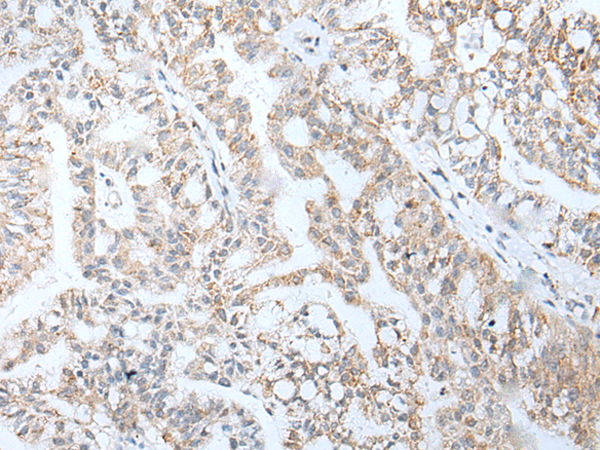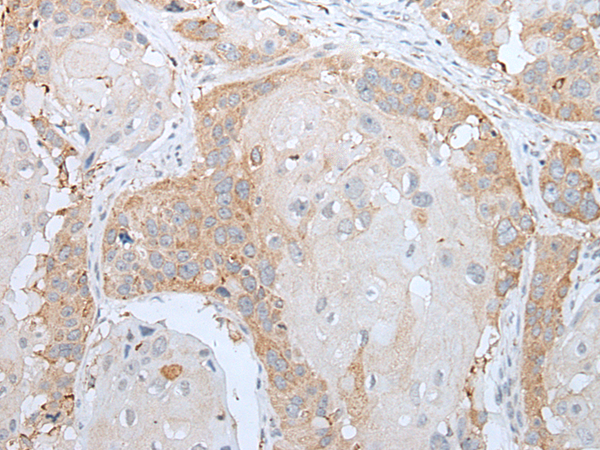

| WB | 咨询技术 | Transfected |
| IF | 咨询技术 | Transfected |
| IHC | 咨询技术 | Transfected |
| ICC | 1/50-1/200 | Transfected |
| FCM | 咨询技术 | Transfected |
| Elisa | 咨询技术 | Transfected |
| Aliases | HOX1; HOX1C; HOX1.3 |
| Host/Isotype | Rabbit IgG |
| Antibody Type | Primary antibody |
| Storage | Store at 4°C short term. Aliquot and store at -20°C long term. Avoid freeze/thaw cycles. |
| Species Reactivity | Human, Mouse, Rat |
| Immunogen | Synthetic peptide of human HOXA5 |
| Formulation | Purified antibody in PBS with 0.05% sodium azide and 50% glycerol. |
+ +
以下是3-4篇关于FOXP3小鼠抗体的参考文献,按文献名称、作者和摘要内容简要整理:
---
1. **文献名称**:*Control of regulatory T cell development by the transcription factor Foxp3*
**作者**:Hori S, Nomura T, Sakaguchi S
**摘要**:该研究首次明确了Foxp3在小鼠调节性T细胞(Treg)发育中的关键作用。作者通过基因工程小鼠模型和Foxp3特异性抗体(小鼠来源的单克隆抗体)的免疫染色,证实Foxp3是Treg细胞的特异性标志物,并对其功能调控机制进行了阐述。
2. **文献名称**:*Foxp3 programs the development and function of CD4+CD25+ regulatory T cells*
**作者**:Fontenot JD, Gavin MA, Rudensky AY
**摘要**:本文通过流式细胞术和免疫组织化学技术,利用Foxp3小鼠抗体(如克隆号FJK-16s)分析了Treg细胞在胸腺和外周免疫器官中的分布及功能。研究揭示了Foxp3在维持Treg抑制活性中的核心地位。
3. **文献名称**:*An optimized protocol for the detection of Foxp3 in regulatory T cells by flow cytometry*
**作者**:Torgerson TR, Colonna M, Marrack P
**摘要**:该文献系统评估了不同物种来源的Foxp3抗体(包括小鼠抗体的特异性与灵敏度),并优化了流式细胞术中Foxp3染色的实验条件。作者强调了抗体克隆选择、固定/破膜步骤对实验结果的影响。
4. **文献名称**:*Comprehensive comparison of anti-Foxp3 antibodies in mouse and human tissues using standardized protocols*
**作者**:Plitas G, Rudensky AY
**摘要**:研究通过标准化实验流程,比较了多种商品化Foxp3抗体(包括小鼠单克隆抗体)在小鼠和人类组织中的表现。结果提示部分小鼠抗体在流式检测中具有更高的特异性,适用于Treg细胞的定量分析。
---
以上文献为研究Foxp3抗体在小鼠模型中的应用及Treg细胞功能提供了重要参考,涉及基础机制、实验方法及抗体性能评估。
The FOXP3 Mouse antibody is a critical tool in immunological research, specifically designed to detect the FOXP3 protein in murine samples. FOXP3. a member of the forkhead/winged-helix transcription factor family, serves as a master regulator of regulatory T cells (Tregs), which are essential for maintaining immune tolerance and preventing autoimmunity. Since its identification in the early 2000s, FOXP3 has become a definitive marker for identifying and studying Treg populations in mice.
This antibody typically targets conserved epitopes within the FOXP3 protein, enabling specific detection in applications like flow cytometry, immunohistochemistry, and Western blotting. Its development stemmed from the need to distinguish Tregs (CD4+CD25+FOXP3+) from activated effector T cells in murine models, a crucial step in understanding immune homeostasis, tumor microenvironments, and inflammatory diseases. Clone FJK-16s is among the most widely used FOXP3 antibodies for mouse tissues, validated for both intracellular staining and formalin-fixed paraffin-embedded samples.
Researchers rely on this reagent to investigate Treg biology in autoimmune disorders (e.g., diabetes, colitis), cancer immunotherapy, and transplantation models. Proper validation using FOXP3-deficient mice ensures specificity, as false-positive signals may occur in activated conventional T cells. The antibody's utility continues to expand with growing interest in Treg modulation as a therapeutic strategy.
×